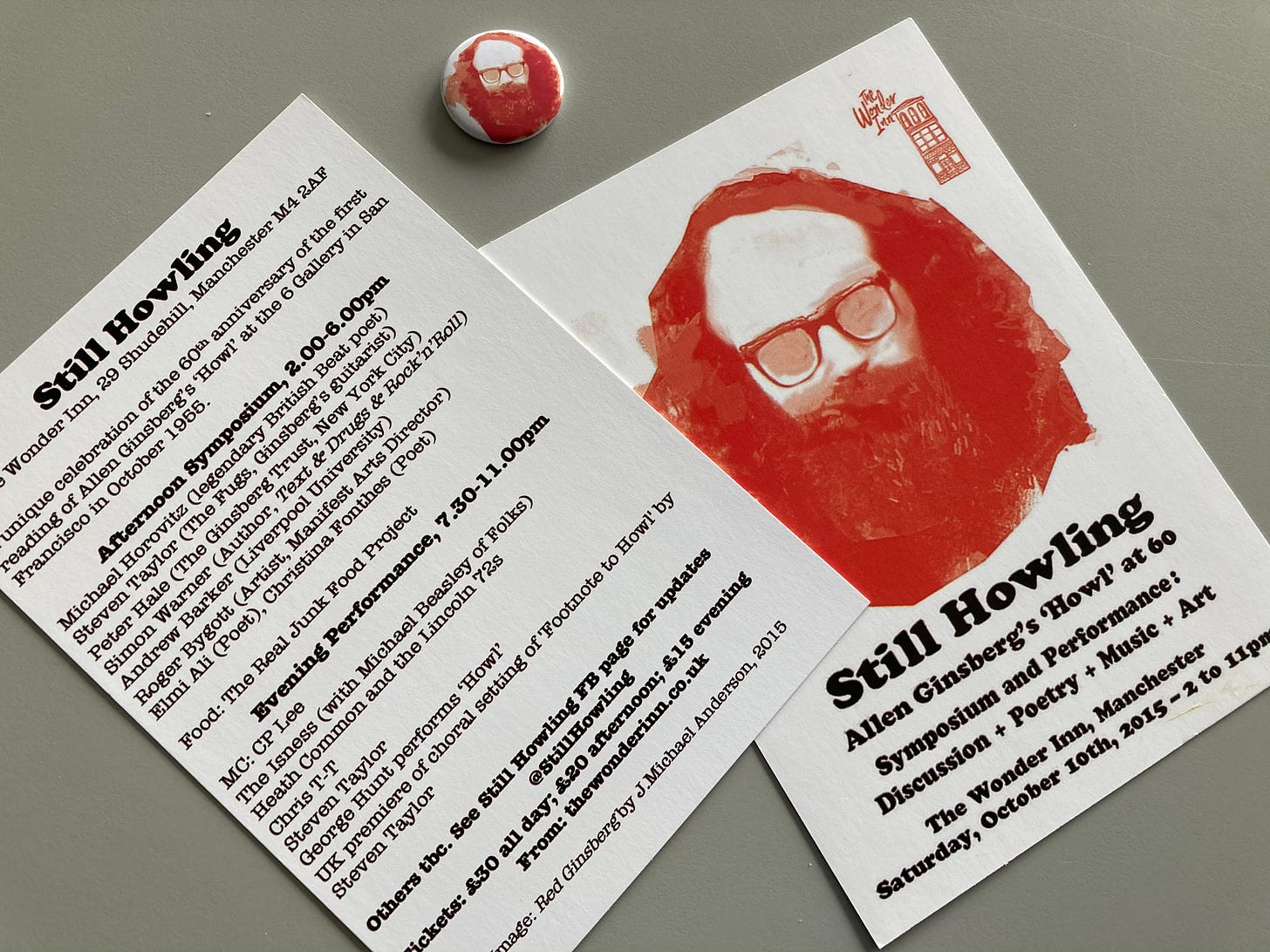Allen Ginsberg: 25 years gone
April 5th, 2022, represents a quarter of a century since the death of a great American poet. We commemorate that notable date by recollecting a 60th anniversary show for his remarkable poem 'Howl'
IN THE autumn of 2015, Manchester, England, played host to a live show which commemorated 60 years since the first reading of Allen Ginsberg’s ‘Howl’. The celebration Still Howling was presented at the Wonder Inn on Saturday, October 10th, an event which ran over the afternoon and into the night, featuring verse and conversation, rock bands, solo performers and choirs.
To recognise the 25th anniversary of Ginsberg’s passing, we share below the essay I wrote for the programme that day and some images linked to the occasion. Worth adding, too, that significant participants in Still Howling have now joined the poet in the pantheon of the lost but not forgotten.
Pictured above: Promotional postcards and badge for Still Howling. Note that Beat biographer extraordinaire Barry Miles, author of the definitive life of Ginsberg, also joined the live bill
The legendary British poet Michael Horovitz died in 2021, the irrepressible host of the evening CP Lee, musician and writer, passed on in 2020 and J. Michael ‘Andy’ Anderson, artist and lecturer, who produced the powerful Red Ginsberg logo of the show felt death’s chill hand only months after the Manchester production. You all live on in our memories, as does Ginsberg himself, of course.
Still Howling, essay from the programme
‘Howl’: A poem for then and now, diamond anniversary of verse gem
By Simon Warner, co-curator
Earlier this year, I was contacted by the Manchester-based installation artist Roger Bygott, who was aware that I had organised Howl for Now, a 50th anniversary celebration of ‘Howl’’s first reading, held in the city of Leeds in 2005. How the years fly by!
He proposed we try and do another birthday event and a decade on seemed a good moment to return to this seminal moment in twentieth-century poetry. So, since that initial conversation, he and I have been organising Still Howling and we hope that this Manchester, 60th anniversary event will be as successful as the half centenary commemoration, which was well attended and produced a book and edited collection of essays called Howl for Now.
'Howl' was a genuine game-changer in all sorts of ways. Until then, this underground gathering of friends and lovers, largely unpublished novelists and poets, dubbed the Beat Generation, was essentially beneath the radar, largely anonymous. Ginsberg was desperate to escape the formal strictures of the academy when it came to poetry, but he was very nervous about expressing his most intense, inner personal feelings.
Here was a Jewish, socialist, second-generation Russian immigrant and a homosexual man to boot, who was likely to upset the conservative WASP establishment on so many levels, at a time when anyone stepping out of line faced censure, the prospect of unemployment, even imprisonment. Ginsberg had devised a new observational poetry, a fractured, fractious consideration of contemporary America, a modernist view of a land ensnared in the post-war paranoia of Cold War politics.
Pictured above: Artist Roger Bygott, co-curator of Still Howling, produced these sketches of Ginsberg for the programme
Yet there was also a deep humanity to the piece. The poem was certainly a tremendously brave gesture and, once it was read in the Six Gallery on October 7th, 1955, the padlocks of repression and inhibition were smashed. In short, 'Howl' introduced powerful and controversial ideas but also trumpeted, by name, those very writers who would become the key, published members of the Beat community, widely read and acclaimed in the decade that followed.
It also opened up the possibility of the counterculture having a voice and, it might be argued, was actually a significant preface to what happened, socially, culturally, even politically, in the West in the 1960s.
Tonight, 'Howl' will be read in its entirety. A young British actor called George Hunt delivered it in Leeds in 2005, and he's going to reprise his recital in Manchester. In addition, we are giving a UK premiere to a choral setting of 'Footnote to Howl', a piece by the musician Steven Taylor, Ginsberg's guitarist for 20 years and a member of the Fugs for around 30 years.
Most exciting is that Steven joins us from New York City, presents a solo set of his own, including Ginsberg's actual harmonium, and performs with the British Beat legend, poet Michael Horovitz, who was a part of the International Poetry Incarnation with Ginsberg at the Royal Albert Hall in 1965. Both Steven and Michael, as friends and collaborators with the poet, provide a marvellous surviving connection with Ginsberg himself.





